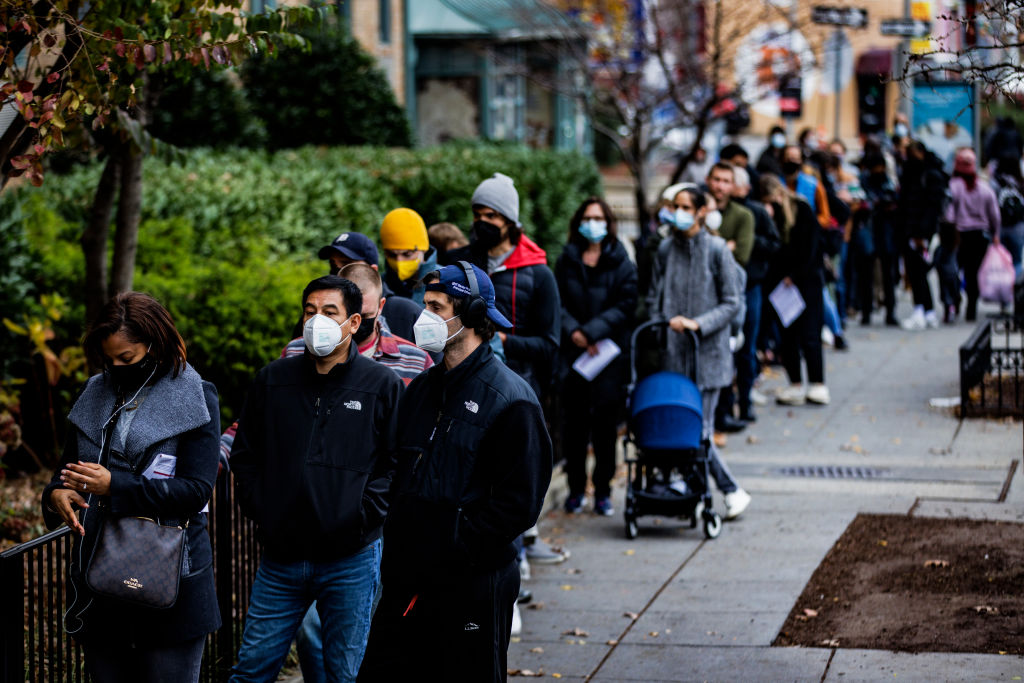Is America's Omicron playbook strong enough?


A free daily email with the biggest news stories of the day – and the best features from TheWeek.com
You are now subscribed
Your newsletter sign-up was successful
A new COVID-19 variant has arrived, and like with other strains before it, America's attack strategy is half-baked, Ed Yong argues in The Atlantic.
Why? Because societally, Yong writes, "policy makers have already cut themselves off from the tools needed to protect the populations they serve" — things like quarantines and mask mandates. Boosters might offer reasonable protection against infection, but only 17 percent of Americans have received them, and now, many are struggling to make appointments. People from rural, low-income, and minority communities will likely experience the greatest delays.
The Biden administration has also opted to make rapid tests reimbursable through health insurance rather than distribute the tests "en masse," which "doesn't address the need where it is greatest," medical geographer Arrianna Marie Planey told Yong; low-wage workers, who deal with a higher risk of infection, "are the least able to afford tests up front and the least likely to have insurance."
The Week
Escape your echo chamber. Get the facts behind the news, plus analysis from multiple perspectives.

Sign up for The Week's Free Newsletters
From our morning news briefing to a weekly Good News Newsletter, get the best of The Week delivered directly to your inbox.
From our morning news briefing to a weekly Good News Newsletter, get the best of The Week delivered directly to your inbox.
And though control measures used for other variants — "masks, better ventilation, contact tracing, quarantine, and restrictions on gatherings" — should, in theory, work for Omicron too, "the U.S. has either failed to invest in these tools or has actively made it harder to use them."
America can't rely on just vaccines to get us out of the pandemic, Yong says. The U.S. attack arsenal must be strengthened with provisions like paid sick leave, stronger masks, improved ventilation, isolation capabilities, and "ways of retaining the frayed health-care workforce." Instead, however, we have "consistently dropped the ball" on many of these measures, neglecting to "build systems and enact policies that protect the health of entire communities" in favor of moving shot to shot.
"Self-interest is self-defeating," Yong argues, "and as long as its hosts ignore that lesson, the virus will keep teaching it."
A free daily email with the biggest news stories of the day – and the best features from TheWeek.com
Brigid Kennedy worked at The Week from 2021 to 2023 as a staff writer, junior editor and then story editor, with an interest in U.S. politics, the economy and the music industry.
-
 How the FCC’s ‘equal time’ rule works
How the FCC’s ‘equal time’ rule worksIn the Spotlight The law is at the heart of the Colbert-CBS conflict
-
 What is the endgame in the DHS shutdown?
What is the endgame in the DHS shutdown?Today’s Big Question Democrats want to rein in ICE’s immigration crackdown
-
 ‘Poor time management isn’t just an inconvenience’
‘Poor time management isn’t just an inconvenience’Instant Opinion Opinion, comment and editorials of the day
-
 A Nipah virus outbreak in India has brought back Covid-era surveillance
A Nipah virus outbreak in India has brought back Covid-era surveillanceUnder the radar The disease can spread through animals and humans
-
 Trump HHS slashes advised child vaccinations
Trump HHS slashes advised child vaccinationsSpeed Read In a widely condemned move, the CDC will now recommend that children get vaccinated against 11 communicable diseases, not 17
-
 Covid-19 mRNA vaccines could help fight cancer
Covid-19 mRNA vaccines could help fight cancerUnder the radar They boost the immune system
-
 FDA OKs generic abortion pill, riling the right
FDA OKs generic abortion pill, riling the rightSpeed Read The drug in question is a generic version of mifepristone, used to carry out two-thirds of US abortions
-
 The new Stratus Covid strain – and why it’s on the rise
The new Stratus Covid strain – and why it’s on the riseThe Explainer ‘No evidence’ new variant is more dangerous or that vaccines won’t work against it, say UK health experts
-
 RFK Jr. vaccine panel advises restricting MMRV shot
RFK Jr. vaccine panel advises restricting MMRV shotSpeed Read The committee voted to restrict access to a childhood vaccine against chickenpox
-
 Texas declares end to measles outbreak
Texas declares end to measles outbreakSpeed Read The vaccine-preventable disease is still spreading in neighboring states, Mexico and Canada
-
 RFK Jr. shuts down mRNA vaccine funding at agency
RFK Jr. shuts down mRNA vaccine funding at agencySpeed Read The decision canceled or modified 22 projects, primarily for work on vaccines and therapeutics for respiratory viruses
